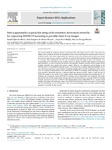Mostrar o rexistro simple do ítem
Data Augmentation Approaches Using Cycle-Consistent Adversarial Networks for Improving COVID-19 Screening in Portable Chest X-Ray Images
| dc.contributor.author | Iglesias Morís, Daniel | |
| dc.contributor.author | Moura, Joaquim de | |
| dc.contributor.author | Novo Buján, Jorge | |
| dc.contributor.author | Ortega Hortas, Marcos | |
| dc.date.accessioned | 2021-11-04T19:57:31Z | |
| dc.date.available | 2021-11-04T19:57:31Z | |
| dc.date.issued | 2021 | |
| dc.identifier.citation | MORÍS, Daniel Iglesias, et al. Data augmentation approaches using cycle-consistent adversarial networks for improving COVID-19 screening in portable chest X-ray images. Expert Systems with Applications, 2021, vol. 185, p. 115681. DOI: 10.1016/j.eswa.2021.115681 | es_ES |
| dc.identifier.uri | http://hdl.handle.net/2183/28802 | |
| dc.description | Financiado para publicación en acceso aberto: Universidade da Coruña/CISUG | es_ES |
| dc.description.abstract | [Abstract] The current COVID-19 pandemic, that has caused more than 100 million cases as well as more than two million deaths worldwide, demands the development of fast and accurate diagnostic methods despite the lack of available samples. This disease mainly affects the respiratory system of the patients and can lead to pneumonia and to severe cases of acute respiratory syndrome that result in the formation of several pathological structures in the lungs. These pathological structures can be explored taking advantage of chest X-ray imaging. As a recommendation for the health services, portable chest X-ray devices should be used instead of conventional fixed machinery, in order to prevent the spread of the pathogen. However, portable devices present several problems (specially those related with capture quality). Moreover, the subjectivity and the fatigue of the clinicians lead to a very difficult diagnostic process. To overcome that, computer-aided methodologies can be very useful even taking into account the lack of available samples that the COVID-19 affectation shows. In this work, we propose an improvement in the performance of COVID-19 screening, taking advantage of several cycle generative adversarial networks to generate useful and relevant synthetic images to solve the lack of COVID-19 samples, in the context of poor quality and low detail datasets obtained from portable devices. For validating this proposal for improved COVID-19 screening, several experiments were conducted. The results demonstrate that this data augmentation strategy improves the performance of a previous COVID-19 screening proposal, achieving an accuracy of 98.61% when distinguishing among NON-COVID-19 (i.e. normal control samples and samples with pathologies others than COVID-19) and genuine COVID-19 samples. It is remarkable that this methodology can be extrapolated to other pulmonary pathologies and even other medical imaging domains to overcome the data scarcity. | es_ES |
| dc.description.sponsorship | This research was funded by Instituto de Salud Carlos III, Government of Spain, DTS18/00136 research project; Ministerio de Ciencia e Innovación y Universidades, Government of Spain, RTI2018-095894-B-I00 research project; Ministerio de Ciencia e Innovación, Government of Spain through the research project with reference PID2019-108435RB-I00; Consellería de Cultura, Educación e Universidade, Xunta de Galicia, Spain through the predoctoral and postdoctoral grant contracts ref. ED481A 2021/196 and ED481B 2021/059, respectively; and Grupos de Referencia Competitiva, grant ref. ED431C 2020/24; Axencia Galega de Innovación (GAIN), Xunta de Galicia, Spain, grant ref. IN845D 2020/38; CITIC, Centro de Investigación de Galicia, Spain ref. ED431G 2019/01, receives financial support from Consellería de Educación, Universidade e Formación Profesional, Xunta de Galicia, Spain , through the ERDF (80%) and Secretaría Xeral de Universidades (20%). Funding for open access charge: Universidade da Coruña/CISUG | es_ES |
| dc.description.sponsorship | Xunta de Galicia; ED481A 2021/196 | es_ES |
| dc.description.sponsorship | Xunta de Galicia; ED481B 2021/059 | es_ES |
| dc.description.sponsorship | Xunta de Galicia; ED431C 2020/24 | es_ES |
| dc.description.sponsorship | Xunta de Galicia; IN845D 2020/38 | |
| dc.description.sponsorship | Xunta de Galicia; ED431G 2019/01 | |
| dc.language.iso | eng | es_ES |
| dc.publisher | Elsevier | es_ES |
| dc.relation | info:eu-repo/grantAgreement/MICINN/Plan Estatal de Investigación Científica y Técnica y de Innovación 2017-2020/DTS18%2F00136/ES/Plataforma online para prevención y detección precoz de enfermedad vascular mediante análisis automatizado de información e imagen clínica/ | |
| dc.relation | info:eu-repo/grantAgreement/AEI/Plan Estatal de Investigación Científica y Técnica y de Innovación 2017-2020/RTI2018-095894-B-I00/ES/DESARROLLO DE TECNOLOGIAS INTELIGENTES PARA DIAGNOSTICO DE LA DMAE BASADAS EN EL ANALISIS AUTOMATICO DE NUEVAS MODALIDADES HETEROGENEAS DE ADQUISICION DE IMAGEN OFTALMOLOGICA/ | |
| dc.relation | info:eu-repo/grantAgreement/AEI/Plan Estatal de Investigación Científica y Técnica y de Innovación 2017-2020/PID2019-108435RB-I00/ES/CUANTIFICACION Y CARACTERIZACION COMPUTACIONAL DE IMAGEN MULTIMODAL OFTALMOLOGICA: ESTUDIOS EN ESCLEROSIS MULTIPLE/ | |
| dc.relation.uri | http://dx.doi.org/10.1016/j.eswa.2021.115681 | es_ES |
| dc.rights | Atribución-NoComercial-SinDerivadas 4.0 Internacional | es_ES |
| dc.rights.uri | http://creativecommons.org/licenses/by-nc-nd/4.0/ | * |
| dc.subject | X-ray portable device | es_ES |
| dc.subject | COVID-19 | es_ES |
| dc.subject | Data augmentation | es_ES |
| dc.subject | Screening | es_ES |
| dc.subject | CycleGAN | es_ES |
| dc.subject | Deep learning | es_ES |
| dc.title | Data Augmentation Approaches Using Cycle-Consistent Adversarial Networks for Improving COVID-19 Screening in Portable Chest X-Ray Images | es_ES |
| dc.type | info:eu-repo/semantics/article | es_ES |
| dc.rights.access | info:eu-repo/semantics/openAccess | es_ES |
| UDC.journalTitle | Expert Systems with Applications | es_ES |
| UDC.volume | 185 | es_ES |
| UDC.startPage | 115681 | es_ES |
| dc.identifier.doi | 10.1016/j.eswa.2021.115681 |
Ficheiros no ítem
Este ítem aparece na(s) seguinte(s) colección(s)
-
GI-VARPA - Artigos [76]
-
GI-C+D - Artigos [116]






